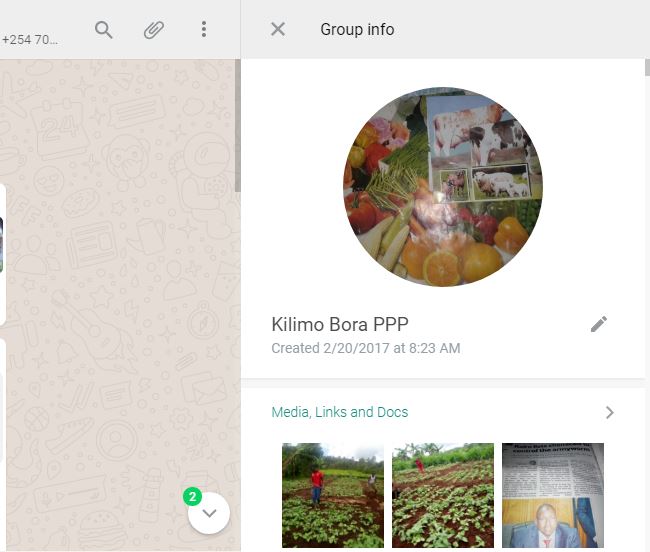A Nyamira farmer who lost more than two thirds of his tomatoes due to bacterial wilt disease three years ago is now harvesting approximately 30 crates of tomatoes in his farm thanks to Kilimo Bora whatsApp group that has helped him better manage the disease through shared knowledge from other farmers.
The group which was created on 20th February 2017 has more than 255 mostly farmers and agricultural experts from organizations such as Seed Co and the Agriculture and Food Authority who advise farmers on the best crop management practices.
Related
Whatsapp helps poultry farmer make more sales on festive season
Farmers make higher sales through WhatsApp
WhatsApp group help farmers access farming Information
One harvest morning in 2015, Reuben Ogendi, a small scale tomato farmer went to his small open field in Nyamusi division, Nyamira County expecting bumper harvest. Unfortunately, about two thirds of his tomato crops had died due to bacterial wilt disease.
“I was devastated and vowed never to engage in tomato farming again as I made losses of up to Sh80,000,” said Ogendi.
However, after being familiarized to Kilimo Bora farmers’ group by a friend in March 2017, Ogendi established a greenhouse to grow tomatoes thanks to proper advice and guidance by members of the group. The group enhances sharing of experiences and knowledge amongst members enabling them to make informed decisions.
In many developing countries like Kenya, farmers receive inadequate information and training prerequisite for maximizing yields and proceeds from their farms. Farmers have thus joined hands together to pool resources such as funds, technology and knowledge sharing to enable them work effectively as a unit.
In collaboration with Kilimo Bora farmer’s group, World Vision donated 10,000 liter water tanks to Ogendi and other small scale farmers in Nyamusi division. “Scarcity of water was a big challenge to me before, I used to utilize my donkey to supply water to my farm”said Reuben. He is one of the 200 farmers from Kilimo Bora public private partnership group who have benefited from the project.
Through the group the farmer also attended several farmer trainings in 2017 facilitated by seed and chemical companies such as agro-chemicals who trained the farmers on how to handle diseases by giving them small booklets to read.
On 29th Dec 2017, he developed his greenhouse measuring 80m by 30m with materials donated and installed for free by World Vision. He bought 5g of Froster F1 tomato seeds from an established agro vet in Kisii town at 1850 shillings. “This variety thrives on all soil types and is resistant to diseases” said Reuben.
He first planted the seeds on a nursery bed before transplanting 700 seedlings to the greenhouse. To control nematodes, he applied 500g of Bio- Nematon insecticide purchased at a cost of 800 shillings from a Kisii agro vet.
He mixed the insecticide with 62.5 liters and used drip irrigation to incorporate to the tomatoes in his green house. He bought 232m water pipes for drip irrigation at 13 sh per meter and sourced additional 150m pipes from his friend.
For every 30 days before maturity, the farmer applied bio-nematon at the rate of 500g per 62.5 liters, even though he faced challenged of acquiring the pesticide from certified agro vets in his village.
Reuben’s tomatoes are now ready for sale and retailers are steaming in to his home to purchase the commodity. So far, he has sold more than ten crates of tomatoes at a cost of Sh2000 per crate. Reuben expects to harvest about 25 to 30 crates from his greenhouse.
He will use the group as a platform to sell his tomatoes and this will make it easier for him to get buyers of the produce.

















Comments powered by CComment